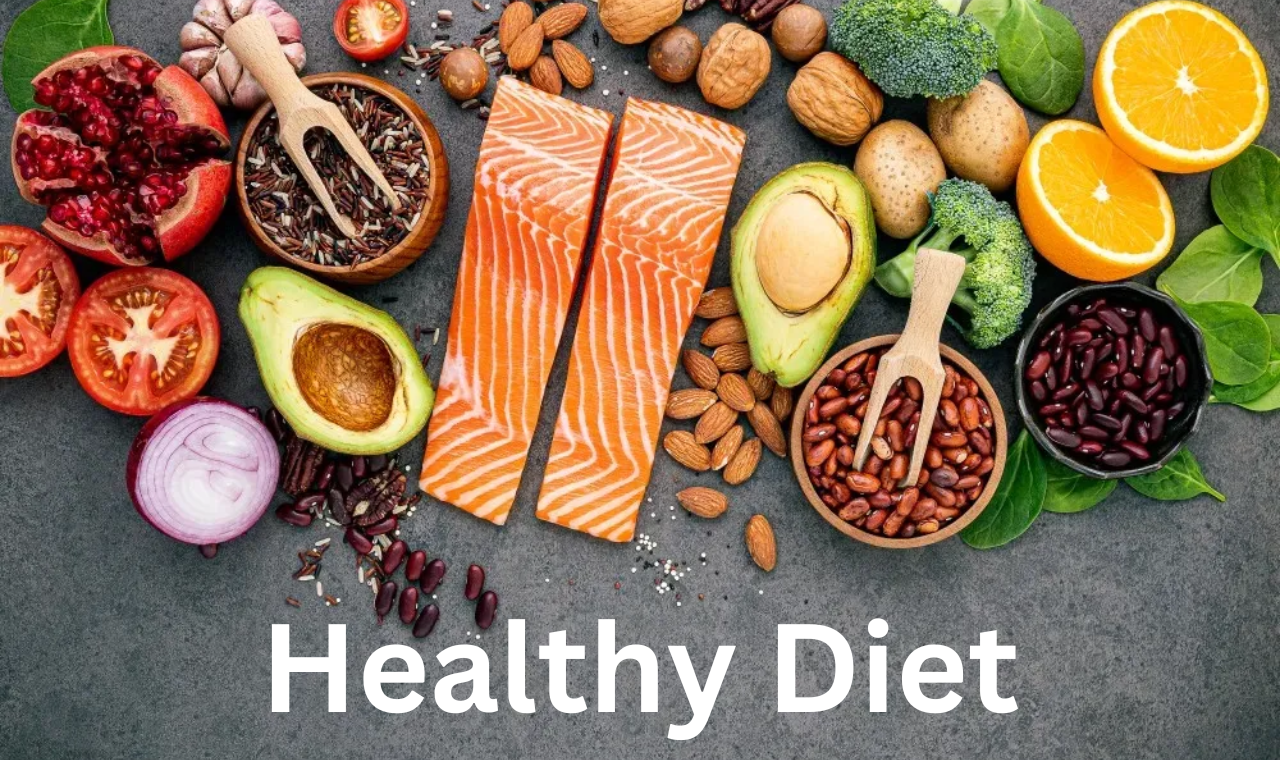A healthy diet plays a crucial role in maintaining overall well-being. What we eat directly affects our energy levels, mental clarity, and long-term health. But with so much conflicting nutrition advice available, it can be challenging to determine what truly constitutes a “healthy” diet.
The key to good nutrition is balance—consuming a variety of foods that provide essential nutrients while avoiding excessive amounts of unhealthy ingredients like added sugars, processed fats, and refined carbohydrates. In this article, we’ll explore the fundamental components of a healthy diet, the benefits of proper nutrition, and some of the latest trends in food science.
What is a Healthy Diet?
A healthy diet consists of whole, unprocessed foods that supply the body with essential nutrients, including proteins, carbohydrates, fats, vitamins, and minerals. The World Health Organization (WHO) and leading health institutions emphasize that a balanced diet should include:
1. Fruits and Vegetables
Fruits and vegetables are packed with vitamins, minerals, antioxidants, and fiber. According to the WHO, consuming at least 400 grams per day can significantly reduce the risk of chronic diseases such as heart disease, stroke, and certain cancers. They also promote digestive health and help maintain a healthy weight.
- Examples: Leafy greens (spinach, kale), berries (blueberries, strawberries), citrus fruits (oranges, lemons), cruciferous vegetables (broccoli, cauliflower).
2. Whole Grains
Unlike refined grains, whole grains contain all three parts of the grain—bran, germ, and endosperm—making them rich in fiber, vitamins, and minerals. Whole grains help regulate digestion, keep blood sugar levels stable, and lower cholesterol.
- Examples: Brown rice, quinoa, whole wheat, oats, barley.
3. Lean Proteins
Protein is essential for muscle repair, immune function, and overall cell health. Lean sources of protein help maintain a healthy weight and reduce the risk of chronic conditions such as diabetes and heart disease.
- Examples: Poultry (chicken, turkey), fish (salmon, tuna), eggs, legumes (lentils, chickpeas), nuts and seeds.
4. Healthy Fats
Not all fats are bad. In fact, unsaturated fats are necessary for brain function, hormone production, and heart health. These healthy fats reduce inflammation and improve cholesterol levels.
- Examples: Avocados, olive oil, nuts (almonds, walnuts), fatty fish (salmon, sardines).
5. Limited Sugar and Salt
Excess sugar and sodium in the diet have been linked to obesity, high blood pressure, and cardiovascular diseases. The WHO recommends reducing added sugar intake to less than 10% of total daily calories and keeping sodium intake below 2,300 mg per day.
- Examples to Limit: Processed foods, sugary drinks, white bread, fast food.
Health Benefits of a Balanced Diet
Eating a balanced diet has a profound impact on health and well-being. Below are some of the most important benefits of proper nutrition:
1. Reduced Risk of Chronic Diseases
A healthy diet helps lower the risk of heart disease, stroke, diabetes, and certain cancers. Antioxidants found in fruits and vegetables help neutralize harmful free radicals in the body, reducing inflammation and cellular damage.
2. Improved Digestive Health
High-fiber foods like whole grains, legumes, and vegetables support digestion by promoting the growth of beneficial gut bacteria. A fiber-rich diet prevents constipation and lowers the risk of developing digestive disorders like irritable bowel syndrome (IBS) and colon cancer.
3. Enhanced Energy Levels
Nutrient-dense foods provide steady, long-lasting energy. Whole grains, lean proteins, and healthy fats keep blood sugar levels stable, preventing energy crashes. In contrast, processed foods high in sugar and refined carbohydrates lead to fatigue and sluggishness.
4. Stronger Bones and Teeth
Calcium, vitamin D, magnesium, and phosphorus are essential for maintaining bone density and preventing osteoporosis. Dairy products, leafy greens, and fortified plant-based alternatives help support bone strength and reduce the risk of fractures.
5. Weight Management
Eating whole, unprocessed foods helps control appetite, improve metabolism, and prevent obesity. Processed foods often lead to overeating because they lack essential nutrients and fiber, which contribute to satiety.
6. Better Mental Health and Mood
Diet directly affects brain function and emotional well-being. Omega-3 fatty acids (found in fish and flaxseeds) are known to improve cognitive function and reduce symptoms of depression and anxiety. Additionally, gut health plays a role in mental health, as a balanced diet promotes the production of serotonin—a neurotransmitter responsible for mood regulation.
Current Trends and Scientific Updates in Nutrition
The science of nutrition is constantly evolving, and recent studies have changed the way people approach healthy eating. Some of the most important updates include:
1. The FDA’s New Definition of “Healthy”
The U.S. Food and Drug Administration (FDA) has revised its criteria for labeling foods as “healthy.” The new guidelines prioritize whole, nutrient-dense foods while limiting added sugars, sodium, and unhealthy fats. This move aims to help consumers make more informed choices when grocery shopping.
2. The Shift Toward Healthy Fats
For years, fat was demonized in mainstream nutrition. However, research now supports the idea that unsaturated fats—such as those found in olive oil, nuts, and avocados—are beneficial for heart health. The outdated low-fat diet trend is being replaced with a focus on healthy fat consumption.
3. The Rise of Plant-Based Diets
More people are embracing plant-based diets, not only for health reasons but also for sustainability. Diets rich in legumes, vegetables, and whole grains have been linked to lower risks of heart disease, obesity, and diabetes. The Mediterranean diet, which incorporates plant-based foods along with healthy fats and lean proteins, is widely recommended for long-term health.
4. The Role of Gut Health in Nutrition
Emerging research highlights the importance of gut microbiota in digestion, immunity, and mental health. Probiotic-rich foods like yogurt, kimchi, and kefir, along with fiber from whole foods, support a healthy gut microbiome.
Practical Tips for Eating Healthier
Making dietary changes doesn’t have to be overwhelming. Here are some practical strategies to improve nutrition:
- Plan Balanced Meals: Ensure each meal contains a mix of protein, whole grains, and vegetables.
- Read Food Labels: Check for hidden sugars and high sodium content in packaged foods.
- Stay Hydrated: Drinking plenty of water supports digestion, metabolism, and overall health.
- Eat Mindfully: Slow down and listen to hunger cues to avoid overeating.
- Cook at Home: Preparing meals at home gives better control over ingredients and portion sizes.
- Snack Wisely: Opt for nuts, yogurt, or fruit instead of processed snacks.
Conclusion
A healthy diet is a cornerstone of long-term well-being. By consuming a variety of whole foods, reducing processed ingredients, and staying informed about evolving nutrition science, individuals can take control of their health. Proper nutrition not only prevents disease but also enhances daily life by improving energy levels, mental clarity, and overall physical health.
As dietary trends continue to shift, one principle remains constant—balance and moderation are key. Small, sustainable changes in eating habits can lead to lifelong health benefits. Making informed choices today will pave the way for a healthier tomorrow.











